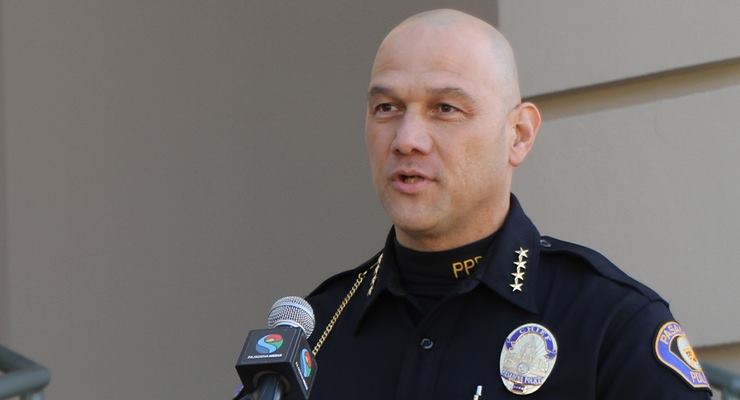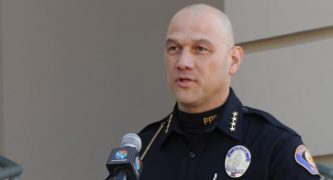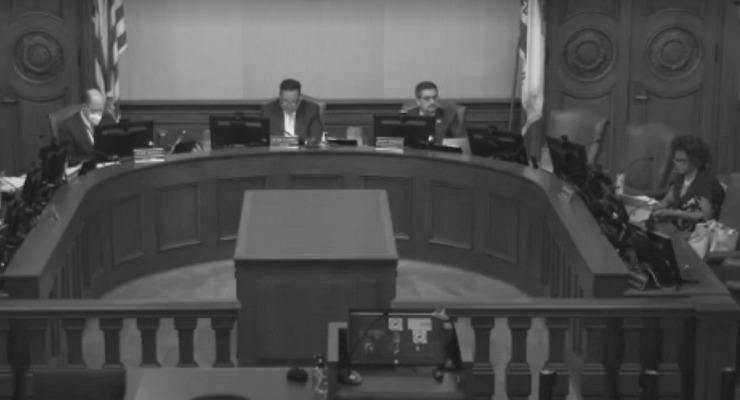
Assemblymember Chris Holden of Pasadena has introduced police reform legislation that would, among other elements, require officers to intervene to physically stop excessive force they witness from a fellow officer and report such incidents in real time to a dispatcher or watch commander.
Pasadena Police Chief John Perez was asked last week his thoughts on the proposal, known as Assembly Bill 1022 — and he said he’s in general agreement with the spirit of the measure as it relates to intervention, though he does have questions about specifics and thinks more needs to be clarified regarding particular X’s and O’s that officers would be required to follow.
“We (the Pasadena Police Department) do have a policy currently about intervening, so this would make it legislation, to have intervening,’’ Perez said. “This one is very specific to the amount of intervening for an officer. We support that type of approach; we train for that through immersive training.’’
But Perez said that while the Police Department’s playbook stresses strong communication among officers as well as de-escalation, it does not specifically use the word “physical.”
That would change, statewide, under Holden’s bill.
As Holden said in a news release last week, “California law requires police officers to intercede when present and observing another officer using force that is beyond that which is necessary, but there are no universal measures used to determine that an officer has in fact interceded.
“In the case of George Floyd (in Minneapolis), a lawyer for one of the accused junior officers argued that there was intervention because the junior officer asked the supervising officer if they should turn Floyd on his side.’’
Perez suggested the specifics of the Holden bill need clarification – though, to be clear, in previous public comments, Perez has called Floyd’s death a “horrific murder,” and last week said of Floyd’s death, “The [second] officer should have put their hands on to help turn him over and start the proceedings with cuffing him.’’
“That would have been a quicker route, better route, and the world would probably be much different today had that happened,’’ Perez said.
As to the questions he has regarding Holden’s bill, Perez said, “Physical intervention is about changing the direction of the techniques being used. If an officer is punching a suspect for some reason, the officer arriving on scene, he’s got to assess that. He doesn’t know why that’s happening.
“If somebody from the public were to see the videos that we release … and the public saw it and said, ‘Oh, wait a second, that officer should have tackled the other one,’ or ‘he should have stopped him right when he arrived,’ that might not be the case.
“The intervention part [of Holden’s bill], it starts with a very confusing aspect. It’s a good start, to talk about intervention – it just needs a lot more detail, because it’s unclear as to what that means.’’
In his interview with Pasadena Now, Perez said, “We expect both verbal and physical [intervention]. Much like de-escalation, you start with verbal and you go to physical. … But for us, physical is not [necessarily] detaining the officer, physical for us is getting involved to get done what you need to get done. …’’
“I could see why [Holden’s] bill is really specific to the physical part of it, but it should start with at least verbal to ensure that it’s quarterback-led, where somebody’s directing it.’’
Ultimately, Perez said, it comes down to training … and officer judgment based on that training.
“The law can say whatever it wants on policy to reduce force – I know this: The Pasadena Police Department didn’t wait for the law. We use immersive training, we use communication skills, de-escalation, and cooperational skills that have led to a 50 percent drop in the use of force,’’ Perez said.
“There’s no policy that smells really good like the best cologne or roses that’s going to guarantee the best outcome. It is the training, the practice, the culture of the organization, and clearly the last resort, the last part, is the officer’s decisions on scene.’’
Perez addressed the culture issue in a June op-ed for Pasadena Now.
“We have made reforms from inside the police department while partnering with our community,” he wrote then. “Half of our top leadership are women and 30 percent are African-American, with other diversity ratios higher than most police departments in this country.’’
“We are proud of our workforce,’’ he went on. “I realize this is not enough and more is needed. We need to better connect all officers with our community so they have familiarization with one another and a connection point that will last for decades.’’
Holden’s proposal would, in addition to requiring officers to physically stop the excessive use of force by another officer:
- Require officers to record and report the incident in real time to dispatch or the watch commander on duty in order to establish that officer has attempted to intervene.
- Prohibit retaliation against officers who report use-of-force violations by a fellow officer.
- Require that an officer who fails to intercede be disciplined in the same manner as the officer who used excessive force.
- Establish a website that makes specified public records of peace officers available in a form searchable by each officer’s name, and allows members of the public to file complaints.
- Disqualify a person from being a peace officer if they have been found by a law enforcement agency that employs them to have either used excessive force that resulted in great bodily injury or death or to have failed to intercede in that incident as required by a law-enforcement agency’s policies.
- Make a peace officer who fails to intercede as required an accessory to any crime committed by the other officer during the use of excessive force.
Perez told Pasadena Now he has some issues with other elements of the bill, particularly the one that could widen public availability of complaints against officers.
“There’s two issues with that one,’’ Perez said regarding the degree of public access to officers’ records.
“One is really understanding the intent of it, and I don’t quite understand the intent. Just to put out more records is always a good thing for politicians, I think, to do, but I believe the intent of that is foggy, I don’t understand what they’re trying to get at. Two, it does breach on some current laws that are out there. …
“What part of records make it sensible? … If you say all records, that’s just an easy thing to say.’’
In addition, Perez said, Holden’s proposal is one of a number of police-reform bills now in the legislative pipeline that “are kind of tripping over each other’’ – and that he thinks the governor might need to step in and direct all that traffic.
“This would require the governor to kind of put that all together and start to look at three or four overriding approaches to these [reforms], whether they be intervening and de-escalation, whether we’re expanding the release of police officers’ discipline (records), whether we’re going to start looking at decertification of police officers for certain type of violations and such,’’ Perez said.
“There’s got to be a framework developed at the state level between the (California Police Chiefs Association) and the politicians in Sacramento to find a balance here.’’
Perez sits on the executive board of the chiefs association, which, he said, often works with legislators regarding law-enforcement bills.
“Every complaint for every reason for every officer to be searchable, just doesn’t seem to make sense at all,’’ Perez said. “There’s got to be a more strategic approach, intellectual approach for both sides to sit down and look at what’s the outcome we’re looking to produce.
“If the intent is just transparency, solely that’s it, I think we have to be much more careful about the consequences of that. Transparency is good … but it’s just got to be – I think at the governor’s level, we need to really identify the direction and have three or four directions for the state to follow.’’














 0 comments
0 comments


